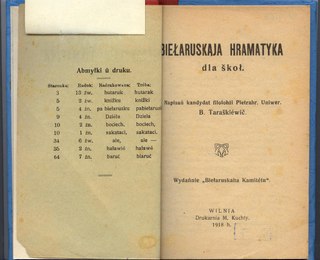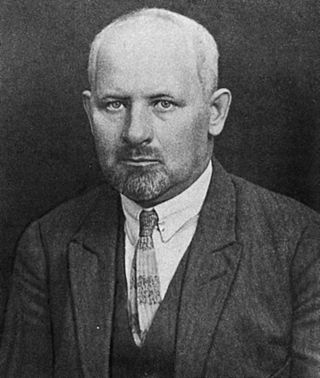
Belarusian is an East Slavic language. It is one of the two official languages in Belarus, alongside Russian. Additionally, it is spoken in some parts of Russia, Lithuania, Latvia, Poland, and Ukraine by Belarusian minorities in those countries.

The Belarusian Latin alphabet or Łacinka for the Latin script in general is the common name for writing Belarusian using Latin script. It is similar to the Sorbian alphabet and incorporates features of the Polish and Czech alphabets. Today, Belarusian most commonly uses the Cyrillic alphabet.

Ge or G is a letter of the Cyrillic script. It is part of the Ukrainian alphabet, the Pannonian Rusyn alphabet and both the Carpathian Rusyn alphabets, and also some variants of the Urum and Belarusian alphabets. In these languages it is usually called ge, while the letter it follows, ⟨Г г⟩ is called he.

The Belarusian alphabet is based on the Cyrillic script and is derived from the alphabet of Old Church Slavonic. It has existed in its modern form since 1918 and has 32 letters. See also Belarusian Latin alphabet and Belarusian Arabic alphabet.

A four-question referendum was held in Belarus on 14 May 1995, alongside parliamentary elections. The four issues were the possibility of giving the Russian language equal status with Belarusian, whether new national symbols should be adopted, whether there should be economic integration with Russia and changes to the constitution that would allow early elections if Parliament systematically violated the constitution. According to official results, all four were approved by at least three-quarters of voters, with a turnout of 64.8%.
Narkamaŭka is a colloquial name for the reformed Belarusian orthography. The name is derived from the Belarusian word narkam (наркам), which was a short form for the early Soviet name for a people's commissar, narodny kamisar in Belarusian. Narkamaŭka is a simplified version of the Belarusian language's orthography, with some scholars claiming that it caused the language to become closer to Russian during Soviet era in Belarus.
The grammar of the Belarusian language is mostly synthetic and partly analytic, and norms of the modern language were adopted in 1959. Belarusian orthography is mainly based on the Belarusian folk dialects of the Minsk-Vilnius region, such as they were at the beginning of the 20th century. Initially, Belarusian grammar was formalised by notable Belarusian linguist Branislaw Tarashkyevich and first printed in Vil'nya (1918). Historically, there had existed several other alternative Belarusian grammars.

Franciszek Dionizy Kniaźnin is considered to be one of the most distinguished Polish poets of the Polish sentimentalism in the Enlightenment period.

Vaclaŭ Justynavič Lastoŭski, 8 November 1883 – 23 January 1938) was a leading figure of the Belarusian independence movement in the early 20th century and the Prime Minister of the Belarusian Democratic Republic from 1919 to 1923, as well as a writer, historian and academic of the Belarusian Academy of Sciences persecuted by the Soviet authorities.
Anatol Hrytskievich was a Belarusian historian. He was a correspondent member of the International Academy of Science of Eurasia (1996–2015), doctor of history (1986–2015), professor (1987–2015). He was born in Minsk.

Piotra Krecheuski was a Belarusian statesman and president of the Rada of the Belarusian Democratic Republic in exile.

Taraškievica or Belarusian Classical Orthography is a variant of orthography of the Belarusian language, based on the literary norm of the modern Belarusian language, the first normalization of which was made by Branislaŭ Taraškievič in 1918, and was in official use in Belarus until the Belarusian orthography reform of 1933. Since 1933, Taraškievica has been used informally in Belarus and by the Belarusian diaspora abroad. In a more common sense Taraškievica is sometimes considered to be a linguistic norm.

Soviet repression in Belarus refers to cases of persecution of people in Belarus under Soviet rule.

West Polesian is the East Slavic dialect group spoken in southwestern Belarus, in northwestern Ukraine and adjoining regions of Poland. There is controversy regarding whether West Polesian belongs to Belarusian or Ukrainian, or is a separate microlanguage.

Oleg Ivanovich "Alhierd" Bakharevich is a Belarusian writer and translator . In 1997 he graduated from the Philological Faculty of the Belarusian Pedagogical University in Minsk. Afterward, Bacharevič worked as a teacher of Belarusian and then as a journalist. His first texts were published in 1993. In the 1990s, he was one of the founders of the Belarusian literary and artistic avantgarde group Bum-Bam-Lit. In 1998, this group published the now cult anthology of their poetry, namely, Tazik biełaruski. At that time Bacharevič married Ksienija Brečka. They have one daughter, Uljana (Ульяна). Between 2007 and 2013, Bacharevič lived in Hamburg, Germany. In 2013, he returned to Minsk and married the Belarusian translator and poet, Julia Cimafiejeva. They lived in the Belarusian capital and cooperated in the field of Belarusian literature and culture, until the Belarusian White Revolution of Dignity in 2020–2021. Subsequently, in order to avoid arbitrary imprisonment and torture, the couple of authors chose emigration and left for Austria.
Neuro Dubel is a Belarusian punk rock band originating from Minsk signed by West Records. It was founded by Alaksandar Kulinkovič and his brother-in-law Hienadź Ahiejčyk on 17 July 1989. The band was recognized as Rock-Kings twice at the Rock Coronation Belarusian Music Awards.

Platon Halavach was a Belarusian writer and editor. During the Great Purge, he became a victim of the 1937 mass execution of Belarusians.
Belarusian Germans formed a notable ethnic minority on the lands of modern Belarus before World War I.
Ivan Alexeyevich Charota is a Belarusian literary critic, Slavist, critic, historian of culture, translator. He is a Doctor of Philological Sciences 1998, and professor since 1999. He is a Laureat of the Republic of Belarus Prize for Spiritual Revival 2003. Foreign member of the Serbian Academy of Sciences and Arts 2009. Member of the Association of Writers of Belarus, the Association of Writers of Russia and the Association of Writers of Serbia 1985.

Oleg Grushecki is a Belarusian writer, journalist, translator, public figure. The revivalist of scouting in Belarus, one of the founders of the «Belarusian Scout Association». Author of literary and historical articles in both Belarusian and foreign scientific publications. Winner of a number of creative awards.













